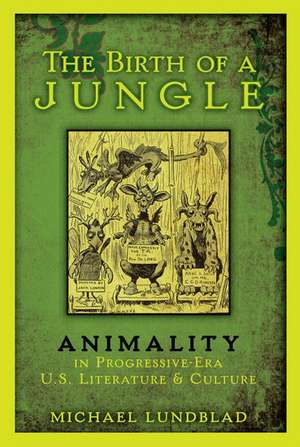The Birth of a Jungle: Animality in Progressive-Era U.S. Literature and Culture
Autor Michael Lundbladen Limba Engleză Paperback – 26 mar 2015
Preț: 248.71 lei
Preț vechi: 309.91 lei
-20% Nou
Puncte Express: 373
Preț estimativ în valută:
47.59€ • 49.82$ • 39.38£
47.59€ • 49.82$ • 39.38£
Carte tipărită la comandă
Livrare economică 25-31 martie
Preluare comenzi: 021 569.72.76
Specificații
ISBN-13: 9780190231583
ISBN-10: 0190231580
Pagini: 234
Dimensiuni: 155 x 231 x 20 mm
Greutate: 0.36 kg
Editura: Oxford University Press
Colecția OUP USA
Locul publicării:New York, United States
ISBN-10: 0190231580
Pagini: 234
Dimensiuni: 155 x 231 x 20 mm
Greutate: 0.36 kg
Editura: Oxford University Press
Colecția OUP USA
Locul publicării:New York, United States
Recenzii
...Lundblad's The Birth of a Jungle is a remarkable achievement and an important contribution to the study of Progressive-Era literature and culture. ... By analyzing animals and environments as discursive formations that produce a range of power relations and identity formations, Lundblad's work ultimately suggests that we ought to supplement our contemporary political contestations over 'actual' animals and environments with a cultural politics that attends just as vigorously to their representations.
The Birth of the Jungle powerfully delineates a pivotal moment in U.S. cultural history in which discursive identification with the nonhuman animal went hand in hand with violent social domination.
This book offers an innovative conceptualization of 'animality' as a historical and theoretical paradigm that reshapes what we thought we knew about human-animal relations in the Progressive Era. The book takes risks as it aims to make important critical interventions. It carves out a unique niche for itself by challenging us to consider how 'animality' pushes us past our own current conceptual critical categories for thinking about human-animal bonds.
Rigorously researched, adeptly argued, and accessibly written, Michael Lundblad's The Birth of a Jungle deserves to be read cover to cover. Illustrated with a plethora of exciting case studies--including the eroticism of Jack London's depiction of wolf-human contacts, the public electrocution of a circus elephant as evincing 1900s class warfare, and the import of racial lynching in the Tarzan series--this book brilliantly reveals a history of animality sutured in the figure of the 'jungle' as an organizing discourse for turn-of-twentieth century literature, law, science, economics, politics, and everyday life.
The Birth of a Jungle is an important, timely consideration of both actual flesh-and-blood animals and how humans have been understood through a discourse of animality. After reading Lundblad's book, it will be impossible not to recognize the prevalence of animality in U.S. literature of this period.
A substantial contribution to modern American fiction studies as well as interdisciplinary animal studies. Lundblad's literary and cultural history uncovers striking alternatives to Darwin and Freud running wild in the period obsessed with identifying, interpreting, and ultimately controlling 'animal instincts.' By problematizing histories that animalize animals alongside humans, The Birth of the Jungle explains why the scholarly practice of literary animal studies can never quite be tamed by the mandates of advocacy and activism.
Scholars aiming to do such rethinking amid this text's complex matrix of ideas should find The Birth of a Jungle an essential resource.
The Birth of the Jungle powerfully delineates a pivotal moment in U.S. cultural history in which discursive identification with the nonhuman animal went hand in hand with violent social domination.
This book offers an innovative conceptualization of 'animality' as a historical and theoretical paradigm that reshapes what we thought we knew about human-animal relations in the Progressive Era. The book takes risks as it aims to make important critical interventions. It carves out a unique niche for itself by challenging us to consider how 'animality' pushes us past our own current conceptual critical categories for thinking about human-animal bonds.
Rigorously researched, adeptly argued, and accessibly written, Michael Lundblad's The Birth of a Jungle deserves to be read cover to cover. Illustrated with a plethora of exciting case studies--including the eroticism of Jack London's depiction of wolf-human contacts, the public electrocution of a circus elephant as evincing 1900s class warfare, and the import of racial lynching in the Tarzan series--this book brilliantly reveals a history of animality sutured in the figure of the 'jungle' as an organizing discourse for turn-of-twentieth century literature, law, science, economics, politics, and everyday life.
The Birth of a Jungle is an important, timely consideration of both actual flesh-and-blood animals and how humans have been understood through a discourse of animality. After reading Lundblad's book, it will be impossible not to recognize the prevalence of animality in U.S. literature of this period.
A substantial contribution to modern American fiction studies as well as interdisciplinary animal studies. Lundblad's literary and cultural history uncovers striking alternatives to Darwin and Freud running wild in the period obsessed with identifying, interpreting, and ultimately controlling 'animal instincts.' By problematizing histories that animalize animals alongside humans, The Birth of the Jungle explains why the scholarly practice of literary animal studies can never quite be tamed by the mandates of advocacy and activism.
Scholars aiming to do such rethinking amid this text's complex matrix of ideas should find The Birth of a Jungle an essential resource.
Notă biografică
Michael Lundblad is Associate Professor of English at the University of Oslo.
